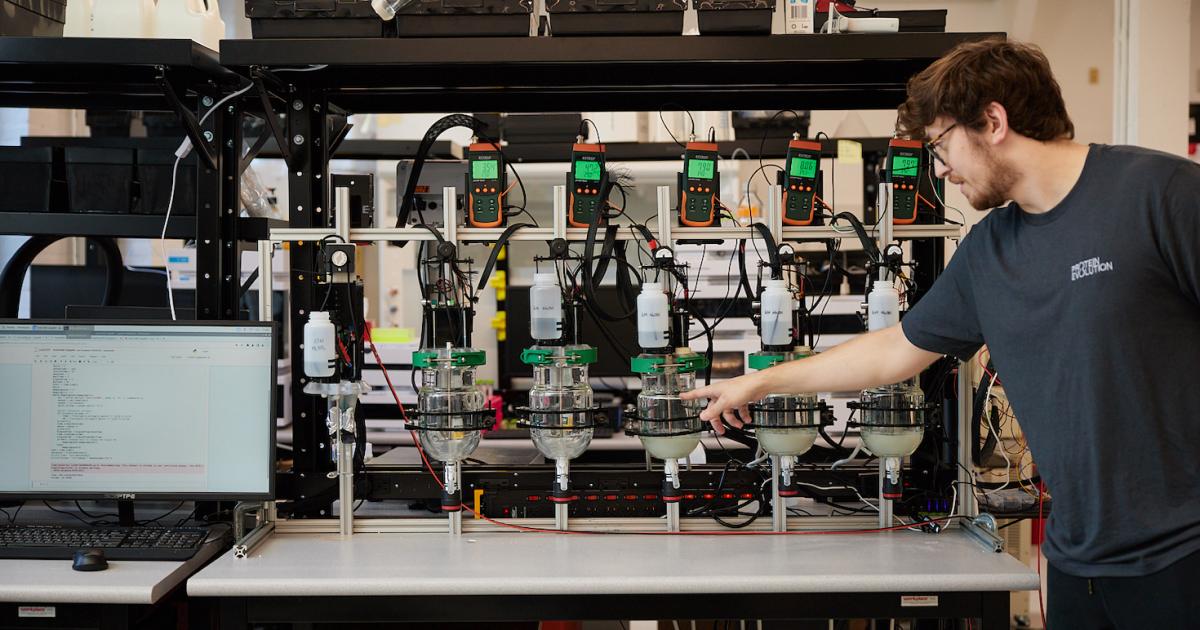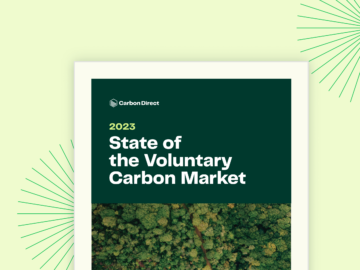
When Lululemon made a minority investment in Australian startup Samsara Eco in mid-May, the move was notable for two reasons.
Not only did the multiyear commitment mark the athletic apparel company’s first investment in a recycling company (the amount wasn’t disclosed), it also represents the fashion industry’s latest endorsement of an emerging approach that relies on enzymes to do the job of breaking down old textiles so that they can be turned into new ones.
Using Samsara Eco’s technology, Lululemon hopes to spin used nylon and polyester blends from pre-owned, damaged or discarded apparel back into a form that can be used in new collections.
“Nylon remains our biggest opportunity to achieve our 2030 sustainable product goals,” said Yogendra Dandapure, vice president of raw materials innovation at Lululemon, in a statement. “Through Samsara Eco’s patented enzymatic process, we’re advancing transforming apparel waste into high-quality nylon and polyester, which will help us live into our end-to-end vision of circularity.”
Why is that such a big deal? The apparel industry uses literally tons of plastic-derived fibers originally derived from petroleum — close to 70 percent of the materials used in yoga pants, jackets, skirts, pants and other apparel contain nylon, polyester, spandex, acrylic, nylon and other textiles that fall into this category. Very little of these materials are recycled today, maybe 15 percent, according to figures from the U.S. Environmental Protection Agency.
Right now, the two main options for fashion brands seeking to repurpose textiles for reuse are mechanical recycling and approaches that use solvents. The challenge with mechanical approaches is that the recovered material must be mixed with virgin plastics in order to maintain their quality, meaning that the material can’t be recycled more than a few times, according to Paul Riley, co-founder and CEO of Samsara Eco. Most chemical approaches, which use solvents to revert plastic polymers back into monomers, tend to require a lot of energy.
Our process can handle hard-to-recycle plastics, contaminated plastics, mixed plastics and plastics containing additives (like colors) again and again, and now textiles in a low-heat environment that is carbon neutral.
In contrast, the enzymatic approach uses less heat to break down the plastic more efficiently into monomers that act like virgin-quality materials, according to Riley. “Our process can handle hard-to-recycle plastics, contaminated plastics, mixed plastics and plastics containing additives (like colors) again and again, and now textiles in a low-heat environment that is carbon neutral,” he said. “This means we already have enough plastic in the world to never need more and can produce virgin-quality plastics without the environmental trade-off.”
Samsara Eco, which raised about $37 million in a Series A round last year, hopes to build enough capacity to recycle 1.5 million metric tons of plastic annually by 2030. For perspective, there’s about 391 million metric tons of plastic produced on a worldwide basis every year — that’s everything, not just textiles.
Aside from Lululemon, Samsara Eco is working with Australian retail company Woolworth’s to develop practical applications for its technology. The retailer intends to start using plastic recycled using Samsara Eco enzymes for some produce containers within the next two years, Riley said.
Not the only option
Scientists have been working on ways to break polyethylene terephthalate (PET) for a couple of decades. A big breakthrough came in 2016, when microbiologist Kohei Oda of the Kyoto Institute of Technology in Japan found a bacteria called Ideonella sakaiensis 201-F6 that would metabolize PET.
The challenge of using plastic-eating enzymes has primarily been a matter of cost, but collaborative research and the use of artificial intelligence is helping accelerate practical applications, according to Gregg Beckham, senior research fellow at the National Renewable Energy Laboratory (NREL) and CEO of the U.S. Department of Energy BOTTLE Consortium, a research initiative backed by industry partners including Amazon, KraftHeinz, Patagonia and Procter & Gamble.
“The reality is that most PET products — especially PET clothing and carpeting — are not recycled today using conventional recycling technologies,” Beckham said in a recent NREL article. “The research community is developing promising alternatives, including enzymes designed to depolymerize PET, but even these options have tended to lean on energy-intensive and costly preprocessing steps to be effective.”
John McGeehan, who is leading research on plastic-eating enzymes at University of Portsmouth (UoP) in the United Kingdom, said the field has benefited from shared contributions from fields as diverse as pharma and biofuels. “We are reaching a point where collaborative science has huge potential to accelerate the development and rollout of enzyme-based solutions at scale,” McGeehan said.
Watch these companies
Samsara Eco is actually one of three startups that’s been making news by talking up this approach and forging relationships with high-profile apparel companies. French startup Carbios is developing a similar approach for textile recycling in collaboration with brands including Patagonia, Puma, PVH and Salomon.
Among the breakthroughs touted by Carbios include the production of an “enzymatically recycled white fiber” from colored textile waste last August.
The company has an exclusive contract with Novozymes to produce the enzymes it needs for its process, and, of the three, it appears closest to having an industrial-scale plant in operation. That facility, being built in France starting later this year, is financed by a joint venture between Carbios and chemical company Indorama Ventures.
When I spoke with Carbios CEO Emmanuel Ladent this spring, he said the company is exploring a number of technology licensing models, including the construction of smaller facilities near points of collection for textiles and other forms of PET. That will be important for building capacity quickly, he said.
Another company to watch is Protein Evolution, an 18-month-old company that hails from New Haven, Connecticut. It has about $25 million in early funding and has attracted the attention of U.K. brand Stella McCartney, which is collaborating with Protein Evolution to turn leftover nylon and polyester into materials for new collections.
Connor Lynn, co-founder and chief business officer of Protein Evolution, said his company will likely locate its facilities near sources of textile and plastic waste that could serve as a feedstock — for example, near warehouses where damaged goods that don’t make it into the hands of consumers are stored or returned.
Lynn touts the low heat used by Protein Evolution’s process as a competitive advantage, as well as its ability to separate polyester out of complex blends and to allow more material to become available for reuse. “What’s beautiful about biology is that it is incredibly specific,” he said.
Like most other circular economy approaches, it will take several years for the enzymatic approach to become commercially viable at scale. But the interest of apparel giants such as Lululemon certainly represents a tipping point.
- SEO Powered Content & PR Distribution. Get Amplified Today.
- PlatoData.Network Vertical Generative Ai. Empower Yourself. Access Here.
- PlatoAiStream. Web3 Intelligence. Knowledge Amplified. Access Here.
- PlatoESG. Automotive / EVs, Carbon, CleanTech, Energy, Environment, Solar, Waste Management. Access Here.
- BlockOffsets. Modernizing Environmental Offset Ownership. Access Here.
- Source: https://www.greenbiz.com/article/why-plastic-eating-enzymes-are-fashion-lululemon-patagonia-stella-mccartney-and-puma
- :has
- :is
- :not
- :where
- $UP
- 1
- 10
- 15%
- 2016
- 2030
- 7
- 70
- a
- ability
- About
- accelerate
- accelerating
- According
- Achieve
- Act
- actually
- additives
- advancing
- ADvantage
- again
- agency
- allow
- already
- also
- alternatives
- Amazon
- amount
- an
- and
- Annually
- apparel
- applications
- approach
- approaches
- ARE
- article
- artificial
- artificial intelligence
- AS
- At
- athletic
- attention
- attracted
- AUGUST
- Australian
- available
- back
- backed
- basis
- BE
- beautiful
- become
- been
- being
- between
- Big
- Biggest
- biology
- blends
- brand
- brands
- Break
- Breaking
- breakthrough
- breakthroughs
- build
- Building
- built
- business
- but
- by
- called
- came
- CAN
- Capacity
- carbon
- Category
- ceo
- certainly
- challenge
- chemical
- chief
- circular economy
- Climate
- Clothing
- Co-founder
- collaborating
- collaboration
- collaborative
- collection
- collections
- commercially
- commitment
- community
- Companies
- company
- Company’s
- competitive
- complex
- Connecticut
- construction
- Consumers
- Containers
- contract
- contrast
- contributions
- conventional
- Cost
- costly
- could
- Couple
- deal
- decades
- Department
- Department of Energy
- Derived
- designed
- develop
- developing
- Development
- DID
- diverse
- do
- Dont
- down
- Early
- economy
- Effective
- efficiently
- emerging
- end-to-end
- energy
- enough
- Environment
- environmental
- Environmental Protection Agency
- EPA
- especially
- Ether (ETH)
- Even
- Every
- everything
- evolution
- example
- Exclusive
- Exploring
- facilities
- Facility
- Fall
- Fashion
- fashion brands
- fellow
- few
- fibers
- field
- Fields
- Figures
- financed
- First
- For
- Forging
- form
- forms
- France
- Free
- French
- from
- funding
- Gamble
- Goals
- goods
- great
- handle
- Hands
- Have
- having
- he
- help
- helping
- high-profile
- high-quality
- his
- hopes
- HTML
- http
- HTTPS
- huge
- i
- important
- in
- include
- Including
- incredibly
- industry
- industry partners
- industry’s
- Initiative
- Innovation
- insight
- Institute
- Intelligence
- intends
- interest
- into
- investment
- IT
- ITS
- Japan
- Job
- jpg
- just
- Kingdom
- laboratory
- Last
- Last Year
- later
- latest
- leading
- Leftover
- less
- Licensing
- like
- likely
- little
- live
- Lot
- Low
- made
- Main
- maintain
- make
- Making
- mark
- material
- materials
- Matter
- McCartney
- meaning
- means
- mechanical
- metric
- million
- minority
- mixed
- models
- more
- most
- move
- multiyear
- must
- National
- Near
- Need
- needs
- Neutral
- never
- New
- news
- Newsletter
- next
- node
- notable
- now
- number
- of
- Officer
- Old
- on
- ONE
- ones
- only
- operation
- Opportunity
- Options
- or
- order
- originally
- Other
- our
- out
- partners
- Patagonia
- patented
- Paul
- percent
- perspective
- pet
- Petroleum
- Pharma
- plastic
- plastics
- plato
- Plato Data Intelligence
- PlatoData
- Point
- points
- Polymers
- potential
- Practical
- Practical Applications
- president
- primarily
- process
- produce
- Produced
- Product
- Production
- Products
- promising
- protection
- Protein
- PUMA
- quality
- quickly
- raised
- Raw
- reaching
- Reality
- reasons
- recycling
- Relationships
- remains
- Renewable
- renewable energy
- represents
- require
- research
- Research Community
- retail
- retailer
- reuse
- revert
- rollout
- round
- s
- Said
- Scale
- Science
- seeking
- senior
- separate
- Series
- Series A
- series a round
- serve
- several
- shared
- similar
- smaller
- So
- Solutions
- some
- Sources
- specific
- Spin
- spring
- start
- Starting
- startup
- Startups
- Statement
- Steps
- stored
- such
- sustainable
- Take
- talking
- tech
- Technologies
- Technology
- textiles
- than
- that
- The
- the United Kingdom
- the world
- their
- These
- they
- this
- this year
- three
- Through
- times
- Tipping
- Tipping point
- to
- today
- tons
- touted
- transforming
- Trends
- TURN
- Turned
- two
- U.K.
- u.s.
- United
- United Kingdom
- university
- us
- use
- used
- uses
- using
- Ventures
- very
- viable
- vice
- Vice President
- Virgin
- vision
- want
- was
- Waste
- Watch
- ways
- we
- WELL
- when
- which
- white
- WHO
- why
- will
- with
- within
- without
- working
- world
- worldwide
- would
- year
- years
- Yoga
- zephyrnet









